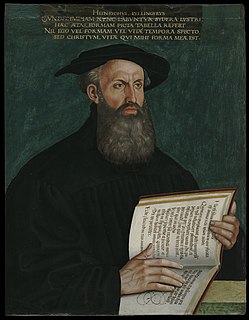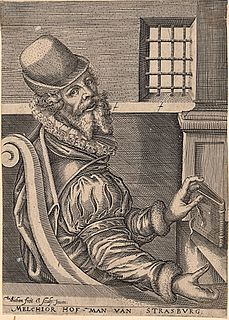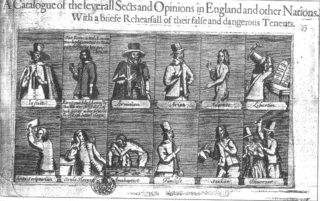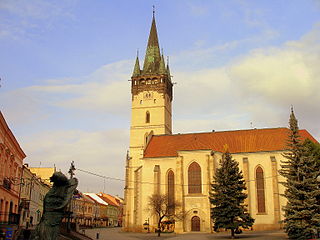
Anabaptism is a Christian movement which traces its origins to the Radical Reformation. The movement is commonly understood to be an offshoot of Protestantism, though this view is not shared by Anabaptists, who view themselves as a separate branch of Christianity.

The Reformation was a major movement within Western Christianity in 16th-century Europe that posed a religious and political challenge to the Catholic Church and in particular to papal authority, arising from what were perceived to be errors, abuses, and discrepancies by the Catholic Church. The Reformation was the start of Protestantism and the split of the Western Church into Protestantism and what is now the Roman Catholic Church. It is also considered one of the events that signify the end of the Middle Ages and beginning of Early modern period in Europe.

Heinrich Bullinger was a Swiss Reformer, the successor of Huldrych Zwingli as head of the Zürich church and pastor at Grossmünster. As one of the most important reformers in the Swiss reformation, Bullinger is known for co-authoring the Helvetic Confessions and his work with John Calvin on the Real Presence of Christ in the Eucharist.
The Pennsylvania Dutch, also referred to as the Pennsylvania Germans, are a cultural group formed by German immigrants settling in the state of Pennsylvania during the 18th and 19th centuries. These emigrated primarily from German-speaking territories of Europe, now partly within modern-day Germany, but also from the Netherlands, Switzerland and Alsace-Lorraine, traveling down the Rhine river to seaports.

Cuius regio, eius religio is a Latin phrase which literally means "whose realm, their religion" – meaning that the religion of the ruler was to dictate the religion of those ruled. This legal principle marked a major development in the collective freedom of religion within Western civilization. Before tolerance of individual religious divergences became accepted, most statesmen and political theorists took it for granted that religious diversity weakened a state – and particularly weakened ecclesiastically-transmitted control and monitoring in a state. The principle of "cuius regio" was a compromise in the conflict between this paradigm of statecraft and the emerging trend toward religious pluralism developing throughout the German-speaking lands of the Holy Roman Empire. It permitted assortative migration of adherents to just two theocracies, Roman Catholic and Lutheran, eliding other confessions.

Conrad Grebel, son of a prominent Swiss merchant and councilman, was a co-founder of the Swiss Brethren movement.

Pilgram Marpeck, also Pilgram Marbeck or Pilgrim Marpeck, was an important Anabaptist leader in southern Germany in the 16th century.

The Münster rebellion was an attempt by radical Anabaptists to establish a communal sectarian government in the German city of Münster – then under the large Prince-Bishopric of Münster in the Holy Roman Empire.

Melchior Hoffman was an Anabaptist prophet and a visionary leader in northern Germany and the Netherlands.
BernhardRothmann was a 16th-century reformer and an Anabaptist leader in the city of Münster. He was born in Stadtlohn, Westphalia, around 1495.

Bernhard Knipperdolling was a German leader of the Münster Anabaptists. He was also known as Bernd or Berndt Knipperdollinck or Knypperdollynck or Bertrand Knipperdoling; his birth name was van Stockem.

Andreas Rudolph Bodenstein von Karlstadt, better known as Andreas Karlstadt or Andreas Carlstadt or Karolostadt, or simply as Andreas Bodenstein, was a German Protestant theologian, University of Wittenberg chancellor, a contemporary of Martin Luther and a reformer of the early Reformation.

English Dissenters or English Separatists were Protestant Christians who separated from the Church of England in the 17th and 18th centuries.

The Radical Reformation represented a response to corruption both in the Catholic Church and in the expanding Magisterial Protestant movement led by Martin Luther and many others. Beginning in Germany and Switzerland in the 16th century, the Radical Reformation gave birth to many radical Protestant groups throughout Europe. The term covers radical reformers like Thomas Müntzer and Andreas Karlstadt, the Zwickau prophets, and Anabaptist groups like the Hutterites and the Mennonites.

The European wars of religion were a series of wars waged in Europe during the 16th, 17th and early 18th centuries. Fought after the Protestant Reformation began in 1517, the wars disrupted the religious and political order in the Catholic countries of Europe.

In 16th-century Christianity, Protestantism came to the forefront and marked a significant change in the Christian world.

Protestantism is a form of Christianity that originated with the 16th-century Reformation, a movement against what its followers perceived to be errors in the Catholic Church. Protestants originating in the Reformation reject the Roman Catholic doctrine of papal supremacy, but disagree among themselves regarding the number of sacraments, the real presence of Christ in the Eucharist, and matters of ecclesiastical polity and apostolic succession. They emphasize the priesthood of all believers; justification by faith rather than by good works; the teaching that salvation comes by divine grace or "unmerited favor" only, not as something merited ; and either affirm the Bible as being the sole highest authority or primary authority for Christian doctrine, rather than being on parity with sacred tradition. The five solae of Lutheran and Reformed Christianity summarise basic theological differences in opposition to the Catholic Church.
The following outline is provided as an overview of and topical guide to Protestantism:
John Stanley Oyer (1925-1998) was an Anabaptist scholar and editor.












